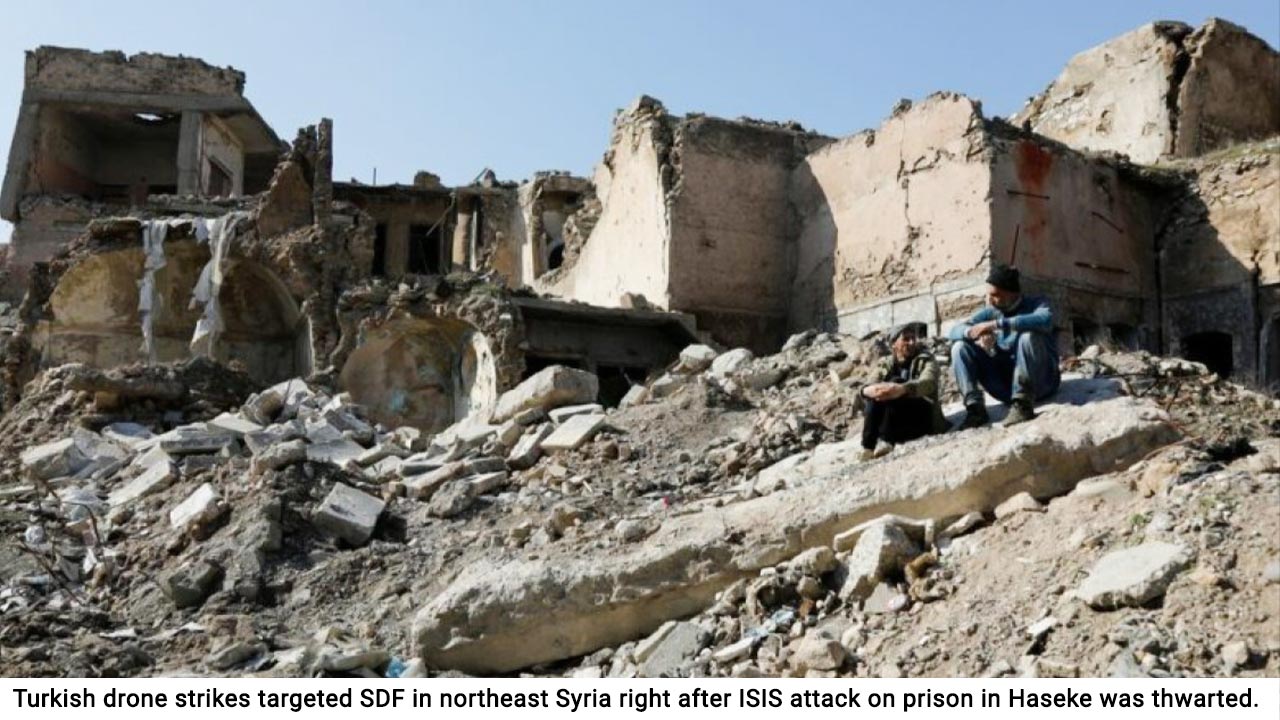Turkish military activity in Syria and Iraq escalated in late January as the Syrian Democratic Forces (SDF) responded to the deadliest ISIS attack since the group’s territorial defeat in Baghouz in 2019. Days later, the leader of ISIS was killed in an American raid on his home in northwest Syria, within walking distance of Turkey’s borders.
These events have raised old questions about the relationship between ISIS and Turkey’s far-right Justice and Development Party (AKP) government. Some observers have argued that there is a degree of active collaboration. Others claim that the Turkish authorities are simply indifferent.
These contentions can be debated, but are impossible to prove without further investigation and documentation. What is apparent is an overarching pattern: the Erdoğan government’s Syria policy remains near-unilaterally focused on crushing Kurdish self-governance, while overlooking the global danger posed by ISIS. This poses serious challenges to regional peace and human rights.

To understand why this is the case, and what can be done to respond, it is essential to understand the relationship between Turkey’s aggressive foreign policy and its domestic political and ideological underpinnings.
Simply put, Kurdish self-governance in any form poses a direct political and ideological threat to Erdogan’s autocratic rule and to the power of the Turkish establishment in general. ISIS does not. The Erdogan government calibrates its actions in Syria accordingly.
What happened?
On January 20, ISIS prisoners detained in the Ghweran Prison in Hasakah, northeastern Syria, staged a violent revolt. The attack took over a week to put down and displaced hundreds of civilians.
As the SDF and the Coalition rushed to respond, Turkey and it’s allied militias seized the chance to escalate.
Shelling increased along the frontlines in Ain Issa and Tel Tamr, injuring women and children. One Turkish drone strike in Syria targeted an SDF vehicle on its way to Hasakah to provide reinforcements. The commander of the 80th Regiment of the Sinjar Resistance Units (YBS), a Yezidi armed force established to fight ISIS after the 2014 genocide, was assassinated in a second Turkish strike in Iraq.
On February 1, while the people of North and East Syria mourned the 121 SDF fighters and local security personnel who lost their lives in the ISIS prison break, Turkey escalated once again.
Over a period of hours, dozens of airstrikes hit civilian sites across both Syria and Iraq, including the Makhmour Refugee Camp, Yezidi villages around Sinjar, and a power station in Derik.

Three Yezidi civilians, five SDF fighters, and two members of Makhmour’s Self-Defense Forces lost their lives in the attacks. Four workers at the Teqil Beqil power station were injured, and the bombing caused at least 20 villages in the surrounding area to lose electricity.
Late the next evening, ISIS leader Abu Ibrahim al-Hashimi al-Qurayshi was killed in a U.S. raid on his home in Atmeh, Idlib, just kilometers from the Turkish border and close to the occupied Kurdish city of Afrin. Notably, Idlib had been the chosen hiding place of Qurayshi’s predecessor, Abu Bakr al-Baghdadi—who was killed there in a similar raid in 2019.
U.S. authorities later revealed that al-Qurayshi had been involved in the planning of the prison break, echoing SDF claims that the violence had been coordinated in areas of Syria that are under Turkish influence. It was also revealed that SDF intelligence contributed to the raid—while Turkey was merely warned.
Understanding Turkey’s Choices
Why did Turkey decide to escalate attacks against the SDF and other anti-ISIS forces while they responded to a major security challenge? And why was a leader of ISIS found, for the second time, within walking distance of Turkey’s highly militarized and surveilled borders?
Turkey’s domestic politics puts these events into a shared context. The Turkish establishment has fought to crush Kurdish self-determination by all possible means, including massacres of civilians, since the founding of the modern republic in the 1920s. The existence of a politicized Kurdish identity remains a threat to the state today—one that can unify factions of the elite whose interests otherwise diverge.
Kurdish political efforts have also challenged Erdogan’s personal power. The most significant electoral challenge his government has ever faced came from the pro-Kurdish Peoples’ Democratic Party (HDP) in June 2015.
With negotiations between the state and the PKK creating a relatively open and democratic political environment for civilian Kurdish politics, the HDP surpassed Turkey’s 10% electoral threshold and entered parliament with 80 seats – a feat no pro-Kurdish party had accomplished before.
The HDP’s success denied Erdoğan’s AKP a majority for the first time. Rather than accommodate greater Kurdish representation and democracy in Turkey at the expense of his own power, Erdogan abandoned peace.
The AKP government used the resumption of the conflict and the crackdown that followed to consolidate its rule and eliminate pro-Kurdish opposition. Elected HDP MPs and mayors were deposed, thousands of people were jailed on “terrorism” charges related to their support for the talks, and cities where the HDP won supermajorities were razed by the military.
Later, Erdoğan extended these anti-Kurdish policies abroad. Turkey’s first intervention in Syria, Operation Euphrates Shield, took place in 2016. While nominally targeting ISIS, its real objective was to take territory between Afrin and Manbij so that the SDF could not connect the two regions and consolidate control of the entire border.
In 2018, Turkey invaded and occupied Afrin, with the goal of not only removing the SDF and the Autonomous Administration of North and East Syria (AANES) but changing the region’s demographics. In 2019, they did the same in Ras al-Ain and Tel Abyad.
Turkish officials cited ‘security’ concerns for each of these operations. But the real threat was political. The AANES and SDF were, and remain, an inspiration to many Kurds within Turkey. Large-scale military operations against them bolstered Turkish nationalist support for the government at home.
ISIS, by contrast, never challenged the power, privilege, and identity of the Erdoğan government or the Turkish state. Its actions in Syria and Turkey alternatively inconvenienced and benefitted their interests.
Though secularism was as important a founding principle of the Turkish state as nationalism, the AKP’s rise and consolidation of power as a right-wing Sunni Islamist party has marked a change. Erdogan has made efforts to impose ultra-conservative religious ideas onto the country’s population. In its efforts to topple the Assad government, Turkey also provided consistent support to radical Islamist factions like Ahrar al-Sham, which were scarcely more moderate than ISIS in their governance.
Thus, ISIS clearly did not pose the ideological threat to the Erdogan government that secular, pluralist, pro-democracy Kurds seeking self-determination did.
The fact that ISIS did not actively seek to change the Turkish political system to accommodate its ideas – unlike both civilian and military groups inspired by the philosophy of the Kurdish movement – underscored this difference. The Kurdish movement could challenge Erdogan’s dictatorial power and the Turkish elite’s authoritarian, nationalist rule; ISIS could not.
While ISIS did carry out several attacks in Turkey, these overwhelmingly targeted tourists and political opposition, not the government or the state. In fact, the deadliest ISIS attack in Turkey was the 2015 Ankara bombing, which killed more than 100 people at a peace rally organized by the HDP, labor unions, and socialist parties.
Just as attacks against Kurds and dissidents within Turkey aligned with the government’s domestic interests, ISIS’ fight against the SDF and AANES in Syria aligned with its foreign policy interests. This first became clear in Kobane, where Erdogan predicted the fall of the city as his troops watched ISIS fighters from their positions on the border.
ISIS victories in northern Syria would have done what Turkish military action would later do in places like Afrin and Ras al-Ain: destroy the SDF and AANES and the society that supported them. Today, though the group can no longer take and hold territory like it could in 2014, its actions can weaken the SDF and AANES, creating optimal conditions for Turkey to further destabilize them.
Future Implications
This history establishes a rule of Turkish policy: Civilian Kurds articulating any demands for self-determination and pluralism must always be countered with more state resources than armed ISIS militants, because Kurdish goals always challenge the power of the Turkish establishment elite, while ISIS’ goals can sometimes benefit it.
This is the calculation under which Kurdish refugees in Makhmour or Yezidi self-defense forces supported by the Kurdish movement in their fight against ISIS in Sinjar, hundreds of kilometers from Turkey, are met with barrages of airstrikes, while the leader of a genocidal jihadist group lives peacefully next to the country’s borders.
As long as the Erdoğan government prioritizes maintaining its own absolute power and crushing Kurdish political aspirations over all other possible strategic goals, Turkish actions will continue to harm counter-ISIS forces while letting jihadists run free.
The U.S., Europe, and other states have historically given Turkey a blank check to target Kurds at home and abroad in the name of ‘fighting terrorism,’ due to the country’s status as a NATO member and longtime Western ally. This holds true when Turkey’s actions threaten the goals of the counter-ISIS campaign in which these same Western states participate.
To sustainably defeat ISIS and end the conflicts in Syria and Iraq that have given the group strength, these states will have to realize that they can no longer have it both ways. They will have to end their support for the Erdoğan government’s authoritarianism and militarism and instead pursue policies that incentivize peace and democracy.
Recent polling shows that many people in Turkey may want such a change. In 2021, for the first time, 52% of the country registered its opposition to cross-border military operations in Syria and Iraq. The same survey found that most Turkish citizens support non-military approaches to addressing the Kurdish question. Erdogan’s autocracy is becoming increasingly unpopular as well, with opposition parties gaining support as the AKP tanks the economy.
Meghan Bodette is an independent researcher in Washington DC. She focuses on Turkey, Syria and Kurdish affairs with a particular focus on women’s rights. Her works have been published by the Wilson Center’s Middle East Program, the National Interest, Newlines Institute, and North Press Agency. She can be followed on Twitter @_____mjb










